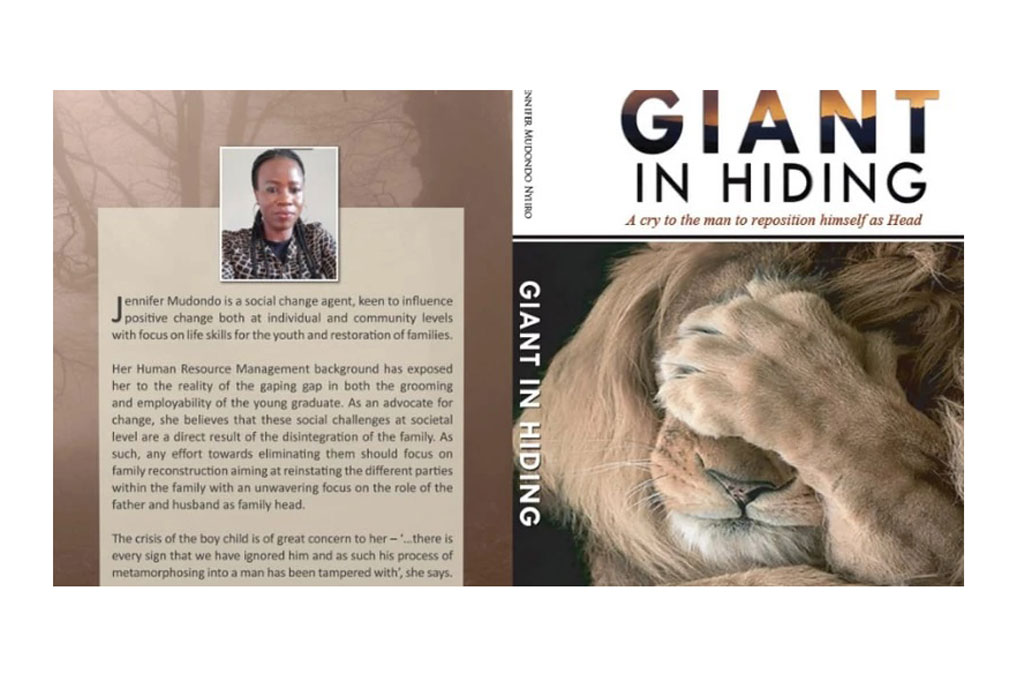Prime
How man can reposition himself correctly as head

Book cover.
What you need to know:
- Book title---- Giant in Hiding: A cry to the man to reposition himself as head.
- Author: Jennifer Mudondo Nyiiro
- Price: Shs30,000
- Where: Aristoc Bookshop.
- Pages: 216
Traditionally, masculinity the world over has been encapsulated in the words “big boys don’t cry.”
Indeed, societal masculine norms have lent themselves to social dominance, and so a man crying has been conceived as “weak.”
However, these days, there is no single, fixed notion of masculinity. For men these days do cry and express their humanity in multiple ways which include, instead of precluding, traditional notions of femininity which tell us only women cry. Still, because of these changes and not in spite of these changes, a topsy-turvy reality has taken hold, rather haphazardly.
And as the role of the woman in society changes too, the man is set adrift in the sea of his own confusion, unable to find safe harbour in the way things once were.
Also, as equality amongst the sexes takes root, a man must share household tasks, pay for most of the bills; and, most importantly, help raise the children instead of simply raising the money to raise the children. Then, for all his efforts, he is often declared as less of a man by the wife and society. This is why fewer and fewer men are manning up to the role of being a man.
Well, partly, as we shall see.
All in all, though, men have fled the home. Their traditional roles are increasingly feminised by the role of provider being taken over by the woman. It is in this context that Jennifer Mudondo Nyiiro attempts to make sense of a senseless reality in her 216-page book, “Giant in Hiding: A cry to the man to reposition himself as head.” In this well written book, she analyses the diminished role of men in society against a personal experience.
Her story begins with her own forebear, Nyiiro, a man in every sense of the word, who is married to Geremina in the village of Bugabula in Luuka. Nyiiro takes pride in his role as a provider, believing that the “art of manhood was handed down from generation to generation.”
He thus raised children, male and females, to be equal to the demands that society would inflict upon them. However, with the focus on his sons, Kuntaangho, the leonine teacher, and Obbo, a local chief in the government, we see how manhood is personified by the two as it evolves and detaches itself from Nyiiro’s vision of the same. Before this happens, Nyiiro, whose son Obbo builds a home within his compound, is the admired elder in the village; until the proverbial road turns.
That is a snapshot of chapter one and two, while in the subsequent chapter found in “Part II: The Mutation”, we are introduced to the story of Santa and Andrew, the parents of triplets.
Andrew, the husband, serves as the personification of a man-child. Ill-prepared for the role of raising a family larger than what he had planned for, he defaults on his duties to his wife and children when he feels his wife, Santa, does not appreciate how hard it is to raise a family in a “tough” world.
In Chapter 4, we return to Nyiiro, a man identified by the accomplishment of how he raises his children. He feels weak when he compares himself to others who have raised their children to reflect the values of manhood. His awakening as a man is linked to how he initiates his boys into manhood. To succeed in this sense ensures he blooms in perfect harmony with the immense energy of traditional reality.
According to this “success”, the finite force of tradition assumes his masculinity is based upon preconceived masculine roles.
"The worlds of the elders do not lock all the doors; they leave the right door open,” reads a Zambian proverb that opens Chapter 13: “Where are the elders?”
Here, we see Nyiiro regaining some of his former esteem as an admired elder and, wait…I will not serve any spoilers beyond saying that Jennifer offers her view that family is society’s foundation stone.
She also looks at how this foundation may be cemented towards ensuring it is saved instead of disintegrated by the role the man plays in the home.
One of her prescriptions towards saving society from itself, as it were, points towards boy-child empowerment programmes.
Here, she advises we “talk to boys, build them up, reassure them and engage their parents. Get model men, fathers, husbands; and family men to share their experiences and build capacity.” Thereby unlocking the doors that the Zambian proverb quoted at the start of Chapter 13 talks about.
“Giant in Hiding” is essentially a book that seeks to ensure that we all realise our true strength by knowing who we are at depth, right now. It calls upon the men to man up, explicitly.
However, its subtext teaches us all, male and female, to learn an awareness of self fully, so we know ourselves as a conscious presence. This way, we grow to trust the fullness of our lives.




